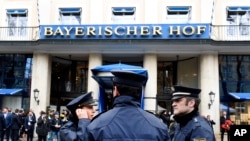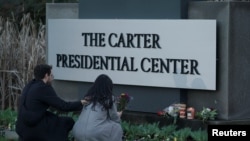ກອງປະຊຸມຄວາມໝັ້ນຄົງປະຈຳປີທີ່ເມືອງມິວນິກໄດ້ເລີ້ມຂຶ້ນໃນວັນສຸກວານນີ້ໂດຍປະທານາທິບໍດີເຢຍຣະມັນ ທ່ານແຟຣັງ ວອລເຕີ ສຕາຍເມຍເອີ ໄດ້ອອກຄຳເຕືອນວ່າ ຣັດເຊຍ ຈີນ ແລະສະຫະລັດ ໄດ້ເຮັດໃຫ້ຄວາມໝັ້ນຄົງຂອງໂລກຕົກຢູ່ໃນອັນຕະລາຍ.
ທ່ານສຕາຍເມຍເອີ ໄດ້ກ່າວຕໍ່ບັນດາຜູ້ນຳ ພວກນາຍທະຫານ ແລະພວກນັກການທູດທີ່ເຂົ້າຮ່ວມ ຢູ່ ໂຮງແຮມເບເຢີຣິສແຊຣ ຮອຟ ໃນເມືອງທາງພາກໃຕ້ຂອງເຢຍຣະມັນວ່າ “ຣັດເຊຍ ໄດ້ເຮັດກຳລັງທະຫານແລະການເຄື່ອນໄຫວທີ່ຮຸນແຮງຢູ່ຕາມຊາຍແດນຂອງຢູໂຣບ ແທນການເມືອງຊຶ່ງເຄີຍໃຊ້ກັນເມື່ອຄັ້ງນຶ່ງນັ້ນ.”
ທ່ານກ່າວເພີ້ມວ່າຈີນ “ຮັບເອົາກົດໝາຍສາກົນ ພຽງແຕ່ເລືອກເອົາບ່ອນທີ່ບໍ່ຂັດກັບຜົນປະໂຫຍດຂອງຕົນ.”
“ແລະພັນທະມິດໃກ້ຊິດທີ່ສຸດຂອງພວກເຮົາ ສະຫະລັດອາເມຣິກາ ພາຍໃຕ້ລັດຖະບານຊຸດປັດຈຸບັນນີ້ ໄດ້ປະຕິເສດຕໍ່ແນວຄິດປະຊາຄົມສາກົນ. ພວກເຮົາຢ້ອນຄືນໄປສູ່ຄວາມຍາກລຳບາກດ້ານຄວາມໝັ້ນຄົງແບບເກົ່າ ບໍ່ມີຄວາມໄວ້ເນື້ອເຊື່ອໃຈຫຼາຍຂຶ້ນ ມີອາວຸດຍຸດໂທປະກອນເພີ້ິ້ມຂຶ້ນ ແລະຄວາມປອດໄພໜ້ອຍລົງ. ນີ້ແມ່ນອັນຕະລາຍທີ່ຕິດຕາມມາ.”
ບັນດາຜູ້ນຳໂລກໄດ້ພາກັນໄປເຕົ້າໂຮມຢູ່ນະຄອນມິວນິກ ພ້ອມດ້ວຍບັນຊີອັນຍືດຍາວກ່ຽວກັບ
ຈຸດລະເບີດ ຢູ່ໃນທົ່ວໂລກ ເພື່ອຈະໄດ້ຮັບການແກ້ໄຂ ນັບແຕ່ການຂັດແຍ້ງ ຢູ່ພາກຕາເວັນອອກກາງ ໄປຫາການແຂ່ງຂັນລະຫວ່າງສະຫະລັດແລະຈີນ. ບັນດາຜູ້ສັງເກດການມາເປັນເວລາດົນນານ ມີຄວາມຮູ້ສຶກເຖິງການປ່ຽນແປງໃນນ້ຳສຽງ.
ທ່ານເຈມສ໌ ເດວິສ ສາດສະດາຈານການເມືອງສາກົນຢູ່ທີ່ມະຫາວິທະຍາໄລ ແຊນກອລເລັນ ໃນປະເທດສະວິດເຊີແລນ ກ່າວວ່າ “ນີ້ແມ່ນການເສີມຂະຫຍາຍໃນຄວາມຮູ້ສຶກຂອງການມີອັນຕະລາຍຊຶ່ງປາກົດວ່າຈະດຶງເອົາຊາວອາເມຣິກັນ ແລະຢູໂຣບໃຫ້ຫຍັບໃກ້ເຂົ້າຫາກັນຫຼາຍຂຶ້ນ”
ລັດຖະມັນຕີປ້ອງກັນປະເທດສະຫະລັດ ທ່ານມາກ ແອັສເພີ ຜູ້ທີ່ເຂົ້າຮ່ວມກອງປະຊຸມເປັນເວລາສາມວັນ ພ້ອມດ້ວຍລັດຖະມັນຕີຕ່າງປະເທດ ທ່ານໄມຄ໌ ພອມພຽວ ໄດ້ສັນລະເສີນບັນດາສະມາຊິກກຸ່ມແນວໂຮມ 82 ທ່ານ ທີ່ໂຮມແຮງກັນ ເພື່ອເອົາຊະນະກຸ່ມກໍ່ການຮ້າຍລັດອິສລາມ ຢູ່ໃນອີຣັກ ແລະຊີເຣຍ.
The annual Munich Security Conference got underway Friday, with German President Frank-Walter Steinmeier issuing a warning that Russia, China and the United States were endangering global security.
"Russia… has made military force and the violent shifting of borders on the European continent the means of politics once again," Steinmeier told the audience of leaders, military chiefs and diplomats at the Bayerischer Hof Hotel in the southern German city.
He added that China "accepts international law only selectively where it does not run counter to its own interests."
"And our closest ally, the United States of America, under the present administration itself, rejects the idea of an international community. We fall back into the classical security dilemma: more mistrust, more armament, and then less security. These are the inevitable consequences."
World leaders have descended on Munich with a long list of global flashpoints to resolve, from regional conflicts in the Middle East to rising competition between the U.S. and China. Long-time observers of the conference sense a change of tone.
"This enhanced sense of danger seems to be pulling the Americans and the Europeans a bit closer together," said James Davis, a Professor of International Politics at the University of St. Gallen in Switzerland.
U.S. Secretary of Defense Mark Esper, who is attending the three-day conference along with Secretary of State Mike Pompeo, hailed the 82-member coalition that had come together to defeat the Islamic State terror group in Iraq and Syria.










